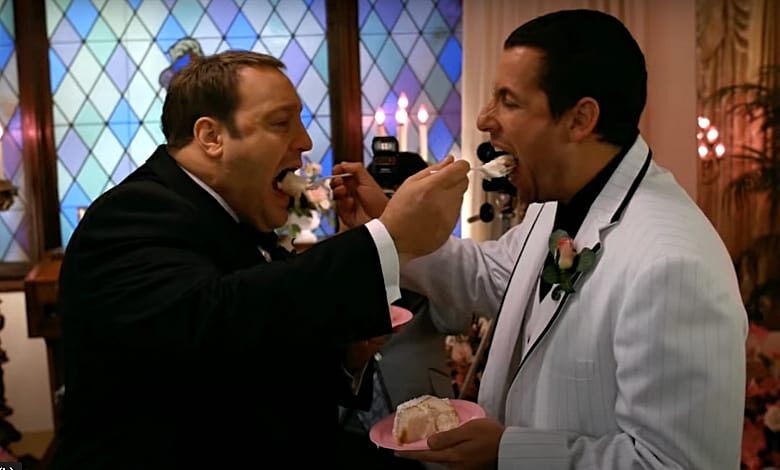‘I Now Pronounce You Chuck & Larry’ – Progressive and Problematic
The 2007 comedy couldn’t be made today. Here’s why that’s a shame

Adam Sandler comedies are the last place progressives seek out “allies.”
The “Saturday Night Live” alum focuses on crude bro-humor, dragging his fellow “SNL” graduates along with him. Sandler comedies aren’t brimming with meaning, beyond the need for male bonding and junior high level slapstick.
Think “Billy Madison,” “The Waterboy” and “Happy Gilmore.”
It’s why “I Now Pronounce You Chuck & Larry” buckled our cultural knees.
Sandler and Kevin James star as two firefighters who get married so James’ character can get insurance coverage for his kids.
These aren’t urban hipsters who salute the LGBTQ flag each morning. They’re rough and tumble guys who recoil at anything approaching the gay lifestyle.
That changes when they’re forced to convince the world, and their fetching attorney (Jessica Biel), they’re the real deal or go to jail for their scam.
RELATED: Esquire Shames Kevin James for Mocking Social Distancing Scolds
“Chuck & Larry” brims with all the gay stereotypes you expect. Mincing voice patterns. Feminine clothing. Swishy antics. For that reason alone, plus repeated use of the “F-word” for gay men, the film wouldn’t survive today’s woke censors.
Team Sandler wouldn’t even bother trying.
They did in the mid-2000s, though, and the movie rang up a sweet $120 million at the U.S. box office.
The film remains a perfect example of why comedies need rough edges. In the case of “Chuck & Larry,” those edges give way to a wildly progressive tale that likely softened some hard hearts in the audience.
Chuck and Larry emerge as activists for gay acceptance, and it comes from a natural, and naughty, evolution. It’s not surprising that the script’s origin points back to Alexander Payne, one of Hollywood’s more insightful artists (assuming you ignore his calamitous “Downsizing”).
There’s plenty of Sandler mayhem in the movie, no doubt, but the story grows richer as it moves on.
One gay character benefits from Chuck and Larry’s scam.
Ving Rhames’ character is part gay stereotype, part narrative buster. He’s a big, burly firefighter buried deep in the closet. When he comes out it’s played for laughs, but his character retains his masculine aura, to a degree.
Even the least woke viewers may cringe at Rob Schneider’s extended cameo. The “SNL” alum routinely appears in Sandler films deep in disguise. Here, he’s an Asian man down to the stereotypical teeth and eyes.
The character connects for all the wrong reasons to Mickey Rooney’s work in “Breakfast at Tiffany’s,” and while it’s not a mean-spirited performance it would find few defenders today.
James’ character has two children, a boy and a girl. The lad is either gay or obsessed with musical theater. Papa loves him dearly but looks baffled that the boy doesn’t live and breathe Mets baseball like daddy.
The youngster plays a small but critical role in the movie’s messaging, as both Chuck and Larry cheer on his passions in the third act. The finale feels a bit woke for its era, pushing the acceptance narrative so hard it overwhelms the comedy.
It’s still touching to see Richard Chamberlain, a veteran actor forced to hide his homosexuality for decades, play a small but critical role.
RELATED: Is the Age of Truth-Telling Comedians Over?
Critics weren’t kind to “Chuck & Larry” during its theatrical release. One modern critic dubbed it Sandler’s worst film, which could only be true if you ignore “Just Go With It.”
“Chuck and Larry” is no comedy classic, and it can’t compare to the iconic laughs found in “Blazing Saddles.” The two still share similar DNA.
The 1974 film is the number one example of an older comedy that can’t be made today. Everyone, including creator Mel Brooks, says as much.
And few disagree.
Brooks’ western romp scorches racism in between the campfire flatulence and genre ribbing. It also shows characters using the “n-word” and otherwise breaking the new woke rules. The message hits home harder because Brooks refused to pull his punches. And he created one of the greatest comedies in modern history that doubled as a primer on hate.
Not bad for a bawdy comedy, no? Except no modern screenwriter would go near that material, or take such risks to explore, and expose bigotry.
Is it any wonder the movie comedy is on life support?
